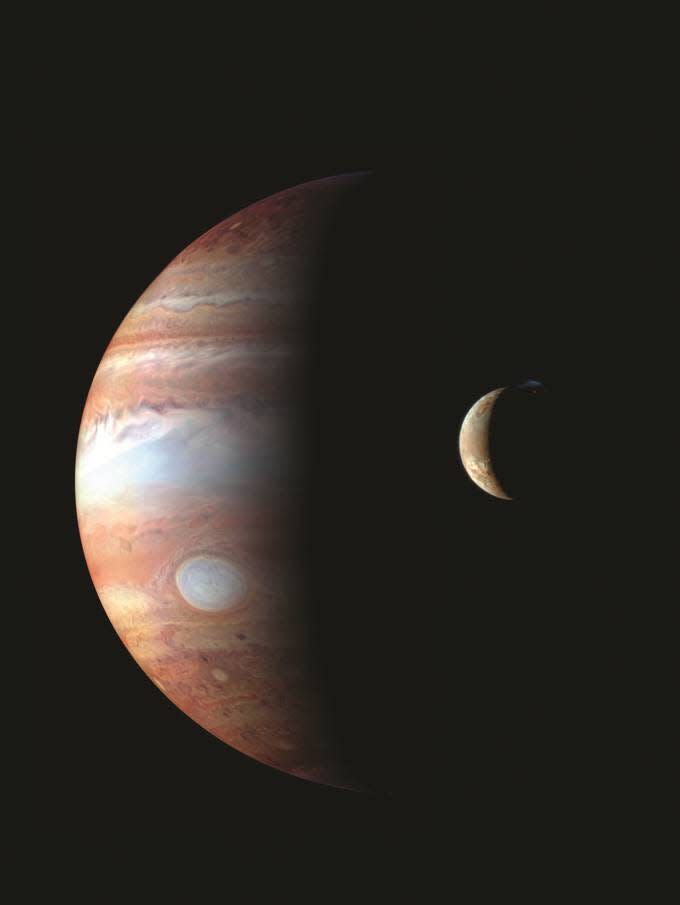NASA footage accompanies 'The Planets' when the Des Moines Symphony performs
- Oops!Something went wrong.Please try again later.
When conductor Joseph Giunta takes the stage at the Des Moines Civic Center this weekend, his baton will not only be leading the Des Moines Symphony, but bending the motion of the planets themselves.
The performance is part of the Des Moines Symphony's latest Masterwork ― Gustav Holst's symphonic movement "The Planets" ― at 7:30 p.m. on Saturday and 2:30 p.m. on Sunday at the Des Moines Civic Center, 221 Walnut St., all set to a backdrop of NASA footage projected during the show.
“The technology is so advanced now that the person that runs the film actually can move the images faster or slower depending on my tempo, which is different than me trying to follow a film that's already been made,” said Giunta, alluding to performances like the "Harry Potter and the Goblet of Fire" In Concert event scheduled for Jan. 27, 2023. "This makes it not only interesting for us, but also, I think, a real pleasure for the audience to see that things are going to really sync up beautifully musically."
This weekend's shows also include performances of Adolphus Hailstork's "Fanfare on Amazing Grace," James MacMillan's "Larghetto for Orchestra" and Elgar Cockaigne's "Overture (In London Town)." A 20-minute intermission follows these performances, after which "The Planets" will be performed.
More:Ballet Des Moines' new characters add modern twist to Tchaikovsky's 'The Nutcracker'
"The Planets" is a seven-movement orchestral suite composed more than 100 years ago by English composer Gustav Holst.
"This all came about because (Holst) was on vacation with a friend who was into telling people's horoscopes," said Giunta, who also noted that Holst was resistant to writing symphonies because of the shadow cast by the great works of the past. "That's what prompted him to think, 'Maybe I should write seven short movements rather than a 55-minute symphony'...
"He was not at all interested in the scientific basis of what one planet does and what the other one doesn't. What interested him was the astrological aspects."
Holst's planetary musical breaks into seven movements ― "Venus, Bringer of Peace," "Jupiter, Bringer of Jollity" and "Saturn, Bringer of Old-age" as well as "Neptune, the Mystic" and "Uranus, the Wizard"
Modern works found influence in Holst's music. For example, listeners can hear echoes of the movement's first piece "Mars, The Bringer of War" in John Williams' work on "Star Wars."
While Holst's favorite segment of "The Planets" was reportedly Saturn, Giunta has a personal fondness for "Neptune, the Mystic," the final piece in the movement, an ethereal piece that uses an all-female chorus.
"I love the fact that after all this noise and playfulness in Mercury and jollity of Jupiter, after all that, (Holst) places this at the very end, after 'Uranus, the Magician,'" said Giunta of the conclusion. "He lived in an age where people wanted loud and flashy endings and virtuosic finales where people stand up and applaud... This ends so quietly, softly and reflectively, that he took a real risk doing that and the fact that he placed it at the end, I think, is perfect."

More:Broadway shows coming to Des Moines include 'The Lion King,' 'Fiddler on the Roof,' 'Six' and more
While audiences have been receptive to the Des Moines Symphony since it returned to the Civic Center last fall, following a long period away due to COVID-19, Giunta noted performances are not quite as well attended as they were pre-pandemic. Shows with a visual component, like the one this weekend, tend to help attract audiences.
“The general trend is that when you have something visual along with the orchestra, that kind of novelty helps attract audiences," he said, going on to explain that, even without NASA footage "The Planets" has been a favorite when performed locally in the past.
Giunta noted that it's important to strike a balance between serving community members who are interested in the symphony performing with visual components and those who are interested in simply hearing great music.
"I am wonderfully fortunate to live in a community and to be the music director of an orchestra in this community that really does support innovation and thrives on creativity," Giunta said. "We are an art form that is based in tradition, but we also have an eye towards the future. What will attract new audiences, other audiences, diverse audiences… It’s all part of my philosophy that an orchestra has to be part of the fabric of the community."
Tickets for this weekend's performances range from $15 to $70 and are available through desmoinesperformingarts.org.
Isaac Hamlet covers arts, entertainment and culture at the Des Moines Register. Reach him at ihamlet@gannett.com or 319-600-2124, follow him on Twitter @IsaacHamlet.
This article originally appeared on Des Moines Register: NASA footage used in Holst's 'The Planets' Des Moines Symphony show

